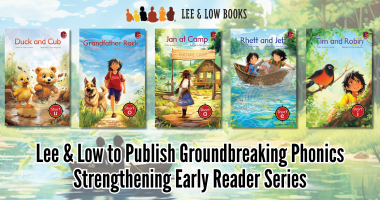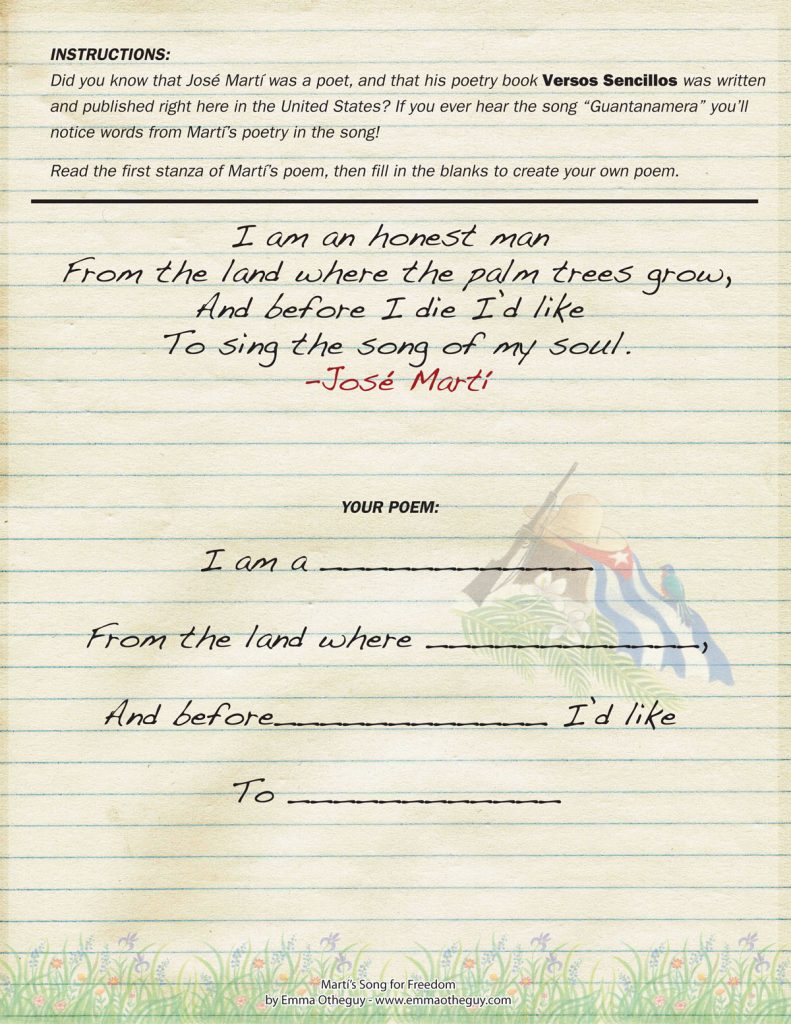In celebration of National Poetry Month, Emma Otheguy, the author of the forthcoming title Martí’s Song for Freedom/Martí y sus versos por la libertad created an amazing activity guide for readers. Modeled after a poem by José Martí, readers can create their own poem after reading his inspirational story as well as excerpts from his seminal Versos sencillos.
You can find the Martí activity guide here in English and in Spanish. Below is a preview of the guide:
About Martí’s Song for Freedom/Martí y sus versos por la libertad:
As a boy, José Martí was inspired by the natural world. He found freedom in the river that rushed to the sea and peace in the palmas reales that swayed in the wind. Freedom, he believed, was the inherent right of all men and women. But his home island of Cuba was colonized by Spain, and some of the people were enslaved by rich landowners. Enraged, Martí took up his pen and fought against this oppression through his writings. By age seventeen, he was declared an enemy of Spain and forced to leave his beloved island.
Martí traveled the world, speaking out for Cuba’s independence. But throughout his exile, he suffered from illness and homesickness. He found solace in New York’s Catskill Mountains, where nature inspired him once again to fight for independence.
Written in verse, with excerpts from Martí’s seminal Versos sencillos, this book is a beautiful tribute to a brilliant political writer and courageous fighter of freedom for all men and women.
Author Emma Otheguy shares her favorite poem by José Martí below and explains why this poem is special to her:
Cultivo una rosa blanca,
En julio como en enero,
Para el amigo sincere
Que me da su mano franca.
Y para el cruel que me arranca
El corazon con que vivo,
Cardo ni oruga cultivo
Cultivo una rosa blanca.I grow a white rose,
In January as in July,
For my dear friend
Who lends me a hand.
And for the bully who breaks
My beating heart
Neither weeds nor worms:
I give him the white rose.
— Emma Otheguy’s translation
“This poem reminds me of my parents, and of stumbling upon street performers singing ‘Guantanamera’ almost everywhere I’ve traveled. But mostly I love this poem because while the words are very simple, they send a powerful message of unconditional love and friendship: they remind readers to give their best to friends and foes, in good times and in bad. When I was a child, I knew that the white roses represented nostalgia for Cuba, and were a way for my family to connect with Cuba despite the distance. I think that growing those roses was also a way of living out the message of the poem, of putting down roots, finding beauty, and cultivating love rather than bitterness in this country.”
For more information on Martí’s Song for Freedom/Martí y sus versos por la libertad, click here.
Stay tuned for more bilingual Martí activities, downloads, and giveaways on our blog and Emma Otheguy’s website: http://emmaotheguy.com/









